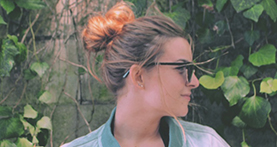 By Susannah Hayward | gargoyle@flagler.edu
By Susannah Hayward | gargoyle@flagler.edu
Right before I turned 10, my mother passed away unexpectedly. There’s no good time to tell someone that. No right way to say it, and no way to prepare someone for hearing it. So, I don’t tell people, and eventually they stumble upon it on their own.
When I was young(er), I wanted to be a marine biologist and travel the world, swimming with dolphins and sharks and learning things people have never learned before. Soon enough though, I figured out that to be a good scientist, you must have a good memory — something I had not been blessed with. So, I decided I wanted to write about the discoveries those scientists made and to photograph the wildlife they studied. It never occurred to me that journalism wasn’t on the “most lucrative careers” list. It didn’t matter to me.
But when my mother died, time stopped and went by too fast all at once. Nobody knew why it happened. Nobody really knew much of anything. All I knew was that my family desperately needed help, and I thought that I was one of the ones who had to provide it. So I aged a few years in that first couple of months and spent most of my time trying to help while staying out of the way. I became obsessed with taking care of others, and I kind of lost the ability to make my own decisions. Every decision I made from then on would be based on whether or not it was good for someone else.
Journalism and creative writing no longer seemed like an option. From then on I wanted to have a career that would enable me to provide for others should they need it. It no longer mattered whether or not I would love what I was doing. When it came time for me to make a decision that would either make or break my future, all I wanted was someone to tell me what to do. It took a long time to figure out that the selflessness I’d become obsessed with after my mother died was selfish in another sense: That in making decisions for others, I never had to take responsibility for them. It was always safe to make other people happy.
It took my father, my sister, my best friend, and the two most impactful teachers I’ve ever had to convince me to go and “just try it out.” Terrifying, right? Nobody I’d known had ever done something like that.
I grew up in Anna, Illinois, (population: 4,300 on a good year), and I graduated high school in a class of 99 students.
Of the 98 people I graduated with:
• 6 joined the military and got shipped off to faraway lands like California and Georgia.
• 1 took a semester off and lived in Washington State for a few months before coming home.
• 1 decided to take a semester off and commit a few months of his life to mission work in Africa.
• The rest went to school nearby or immediately joined the workforce.
Oh, and one (that’s me) moved a million miles away (821 to be exact) to attend Flagler College.
When I started telling people where I was going to college, their reactions would always be the same raised eyebrow look of interest followed by an immediate question: “What are you going to study?” It was a well-meaning question, and they were genuinely interested. No one goes that far from home if they’re not going to be doing something prestigious (and lucrative), right?
So, I’d smile really big and say, “journalism and creative writing,” and their eyebrows would raise a little more, because they didn’t want me to see just how surprised, yet disappointed they were. I can’t tell you how often I’ve heard some variation of, “Oh. You better get used to being a broke college kid, then,” or how many times I’ve faltered trying to gracefully respond. I felt guilty. I still do.
Despite the guilt, though, there’s still an overwhelming sense of pride in it. I feel the need to prove to the people that thought I would try it out and come running back to the safety of southern Illinois that they were wrong. If not for myself, then for my mother.



Be the first to comment on "For one freshman, learning to try it out and let go of what others think"